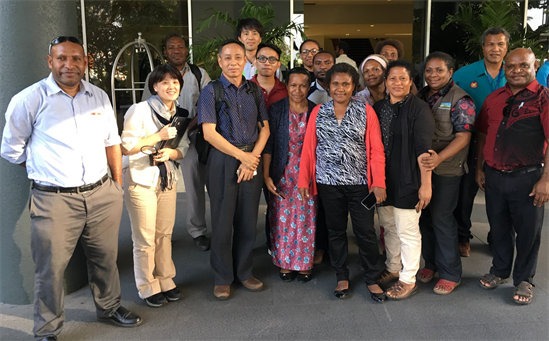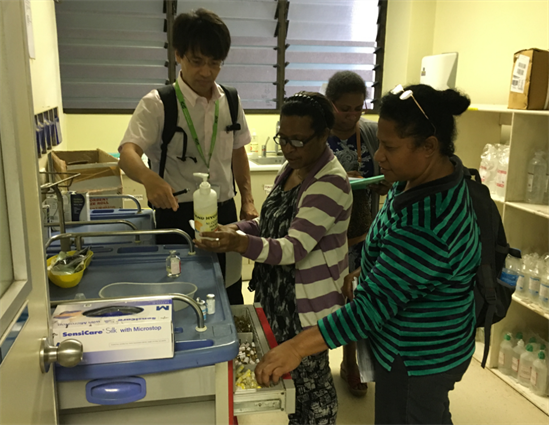The Disease Control and Prevention Center (DCC) of the National Center for Global Health and Medicine in Japan has been a WHO Collaborating Centre for Prevention, Preparedness and Response to Emerging Infectious Diseases since April 2017.
The centre’s collaboration with WHO focuses on two areas. One is to provide technical support to WHO in helping countries prepare for emerging infectious diseases with an emphasis on infection prevention and control and clinical management in the context of the International Health Regulations (2005). The other is to collaborate with WHO to strengthen country response capacity for emerging infectious disease outbreaks.
The Asia-Pacific Economic Cooperation summit took place November 2018 in the Papua New Guinea capital of Port Moresby. To address the risk of transmission and spread of infectious diseases at health-care facilities during the summit, the National Department of Health of Papua New Guinea held a three-day infection prevention and control workshop in July 2018. The workshop was organized in with WHO collaboration and technical assistance from the DCC. Eight health-care workers from the five hospitals in the country’s National Capital District attended the workshop. The hospitals are designated as priority health-care facilities for case management during the summit. This workshop was designed to increase understanding of basic infection prevention and control operations and practices, as well as to help participants develop action plans based on the infection prevention and control assessments made in each hospital.
Prior to the workshop, experts from the DCC and WHO conducted an assessment of inpatient wards and outpatient service areas of four different types of hospitals. They also interviewed health-care workers and hospital administrators regarding implementation of infection prevention and control measures.
The workshop was composed of lectures, discussions, simulation exercises and hospital visits. Topics covered included:
- introduction to infection prevention and control (also known as IPC), current status and achievements;
- standard precautions and hand-hygiene;
- antimicrobial resistance;
- detection and management of outbreaks in health facilities;
- using a sample checklist for infection prevention (through an exercise involving infection control team rounds at participating hospitals);
- self-assessment using the WHO assessment framework;
- planning actions for the improvements of IPC for health security in each hospital; and,
- discussion and way forward.
Workshop participants shared knowledge, good practices, challenges and lessons learnt from their work and experience with IPC. The workshop also served as an opportunity for networking among the hospitals for capacity development, and monitoring and evaluation for improvement of IPC. Working with WHO, the DCC aims to continue to strengthen IPC in priority countries.

Participants of the Infection Prevention and Control Workshop in 2018

An expert from DCC joining the visit to Port Moresby General Hospital
